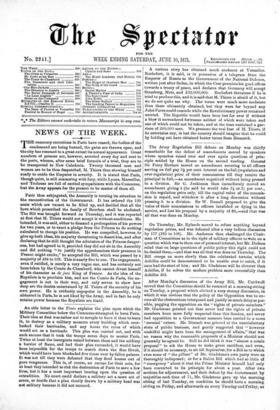Paris thus subjugated, the Assembly is turning its attention to
the reconstitution of the Government. It has ordered the 120 *eats which are vacant to be filled up, and decided that all the laws which proscribed the family of Bourbon shall be abolished. The Bill was brought forward on Thursday, and it was reported at first that M. Thiers would not accept it without conditions. He intended, it was said, either to demand a prolongation of his powers for two years, or to exact a pledge from the Princes to do nothing calculated to change his position. He was compelled, however, to give up both ideas, his majority threatening to desert him, and after declaring that he still thought the admission of the Princes danger- sans, but had agreed to it, provided they did not sit in the Assembly -and did nothing "to justify the apprehensions their presence in Trance might excite," he accepted the Bill, which was passed by a majority of 484 to 103. This is nearly five to one. The engagement, even if ratified, is surely a very vague one, and has certainly not 'been taken by the Comte de Chambord, who cannot divest himself of his character as de jure King of France. As the idea of the Royalists is to proclaim him, and not the Comte de Paris, the en- gagement is not in their way, and only serves to show how deep are the doubts entertained by M. Thiers of the security of his own power. He is evidently unpopular in the Assembly, he is abhorred in Paris, he is not liked by the Army, and in fact he only retains power because the Royalists are timid.


































